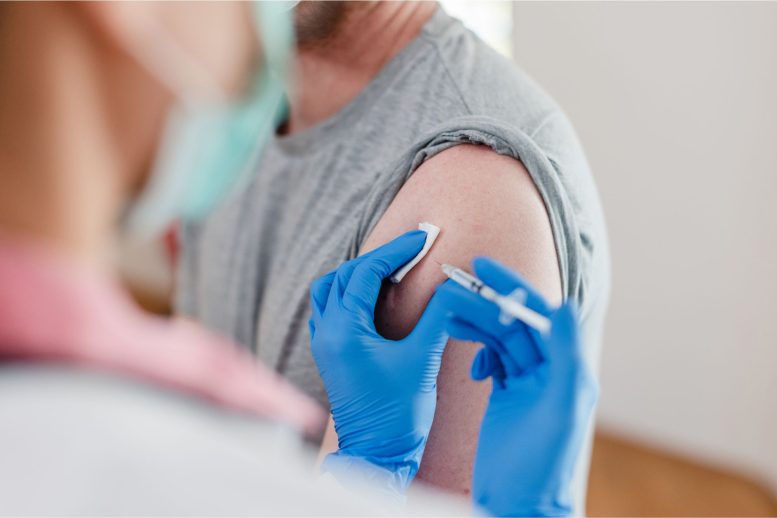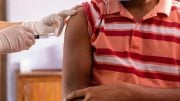
A study on a man with over 200 COVID-19 vaccinations revealed a fully functional and even enhanced immune response, debunking the theory that excessive vaccination weakens immunity, as shown in research findings published in The Lancet Infectious Diseases.
Researchers at FAU have discovered no negative effects on the immune system.
Scientists at Friedrich-Alexander University Erlangen-Nürnberg (FAU) and Erlangen University Hospital have studied a man who has undergone over 200 Covid-19 vaccinations. They learned of his case via newspaper reports. Until now, it has been unclear what effects hypervaccination such as this would have on the immune system.
Some scientists were of the opinion that immune cells would become less effective after becoming used to the antigens. This proved not to be the case in the individual in question: his immune system is fully functional. Certain immune cells and antibodies against SARS-CoV-2 are even present in considerably higher concentrations than is the case with people who have only received three vaccinations. The results have been published in the journal The Lancet Infectious Diseases.
More than 60 million people in Germany have been vaccinated against SARS-Coronavirus 2, the majority of them several times. The man who has now been examined by researchers at FAU claims to have received 217 vaccinations for private reasons. There is official confirmation for 134 of these vaccinations.
“We learned about his case via newspaper articles,” explains Privatdozent Dr. Kilian Schober from the Institute of Microbiology – Clinical Microbiology, Immunology and Hygiene (director Prof. Dr. Christian Bogdan). “We then contacted him and invited him to undergo various tests in Erlangen. He was very interested in doing so.” Schober and his colleagues wanted to know what consequences hypervaccination such as this would have. How does it alter the immune response?
As a rule, vaccinations contain parts of the pathogen or a type of construction plan that the vaccinated person’s cells can use to produce these pathogenic components themselves. Thanks to these antigens, the immune system learns to recognize the real pathogen in the event of a later infection. It can then react more rapidly and forcibly. But what happens if the body’s immune system is exposed extremely often to a specific antigen?
“That may be the case in a chronic infection such as HIV or Hepatitis B, that has regular flare-ups,” explains Schober. “There is an indication that certain types of immune cells, known as T-cells, then become fatigued, leading to them releasing fewer pro-inflammatory messenger substances.” This and other effects triggered by the cells becoming used to the antigens can weaken the immune system. The immune system is then no longer able to combat the pathogen so effectively.
Blood samples from several years investigated
The current study, which also involved researchers from Munich and Vienna, does not deliver any indication that this is the case, however. “The individual has undergone various blood tests over recent years;” explains Schober. “He gave us his permission to assess the results of these analyses. In some cases, samples had been frozen, and we were able to investigate these ourselves. We were also able to take blood samples ourselves when the man received a further vaccination during the study at his own insistence. We were able to use these samples to determine exactly how the immune system reacts to the vaccination.”
The results showed that the individual has large numbers of T-effector cells against SARS-CoV-2. These act as the body’s own soldiers that fight against the virus. The test person even had more of these compared to the control group of people who have received three vaccinations. The researchers did not perceive any fatigue in these effector cells, they were similarly effective as those in the control group who had received the normal number of vaccinations.
Memory T cells are another aspect the researchers explored. These are cells at a preliminary stage, before effector cells. Similar to stem cells, these cells can replenish numbers of suitable effector cells. “The number of memory cells was just as high in our test case as in the control group,” explains Katharina Kocher, one of the leading authors of the study. “Overall, we did not find any indication for a weaker immune response, rather the contrary.” In addition, even the 217th vaccination that the man received during the study still had an effect: the number of antibodies against SARS-CoV-2 increased significantly as a result.
Immune system remains active against other pathogens
Further tests indicated that there was no change to the immune system’s effectiveness against other pathogens. It therefore appears to be the case that the hypervaccination has not damaged the immune system as such. “Our test case was vaccinated with a total of eight different vaccines, including different available mRNA vaccines,” stated Dr. Kilian Schober. “The observation that no noticeable side effects were triggered in spite of this extraordinary hypervaccination indicates that the drugs have a good degree of tolerability.”
However, this is one individual case. The results are not sufficient for making far-reaching conclusions let alone recommendations for the general public. “Current research indicates that a three-dose vaccination, coupled with regular top-up vaccines for vulnerable groups, remains the favored approach. There is no indication that more vaccines are required.”
Reference: “Adaptive immune responses are larger and functionally preserved in a hypervaccinated individual” by Katharina Kocher, Carolin Moosmann, Felix Drost, Christine Schülein, Pascal Irrgang, Philipp Steininger, Jahn Zhong, Johannes Träger, Bernd Spriewald, Christoph Bock, Dirk H Busch, Christian Bogdan, Benjamin Schubert, Thomas H Winkler, Matthias Tenbusch, Ev-Marie Schuster and Kilian Schober, 4 March 2024, The Lancet Infectious Diseases.
DOI: 10.1016/S1473-3099(24)00134-8









Doesn’t prove anything!!! Each individual have his own particular physique.
It takes on average 12 to 15 years to study and approve new drugs for proper approval. One person doesn’t make a comprehensive scientific study.
Vaccines were rushed. Totally irresponsible and we still don’t have a clue as to lon term results. Author of this article said “debunked”. Due to this (1) case. Irresponsible journalism.
Yeah, but it did something to his brain, obviously. (sarcasm)
Stanley is right, everyone’s biochemistry reacts differently, and the study applies only to this one man. Scott is right too, people have died due to vaccination; most don’t, obviously, but the article failed to mention any risk.
I would like to thank the authors of the article at FAU for not making extended or absurd claims about vaccine safety based on this one man. However, as Scott noticed, despite the article saying “The results are not sufficient for making far-reaching conclusions”, the caption under the image says this is “debunking the theory that excessive vaccination weakens immunity”, which is absurd. The style of that caption does not match the article’s style, so I believe someone has tacked the nonsense onto the article. I believe it wasn’t scitechdaily, as this was also published verbatim with the caption Teraplay Rehabilitacion Fisica.
I’m more concerned about a health system that accidentally vaccinates a man 217 times, or at least a verified 134 times. What kind of medical system does this to anyone, sane or not? What medical ethics could permit doctors or nurses to treat any patient this irresponsible way, so ignorant of the patient’s status or taking such unknowable risks?
So what I still will never comply to this evil government!!!!!
If a German starts chasing us with 217 needles, or any needles, let’s both run.
Authors of this “study,” if you really stand behind the results, please get vaccinated 217 times to prove it.
“The results are not sufficient for making far-reaching conclusions”
The results using a single subject are not sufficient for making ANY kind of conclusion.
Please do a search for this 2018 article: “Poison pass: the man who became immune to snake venom.” I’m not saying the injections are that deadly, but you get the idea.
Now with increasing unexplained deaths (with the now ever present censoring)..
NO ONE (but maybe GOD) knows long range effects from Covid or the thing that was mostly forced on people called a vaccine. I’m all for voluntery decision and for FACTS, not mandates, not red/blue agendas, not for control freaks who seized a crisis to gain more power.
As for this guy who did this… we don’t know that it wasn’t WATER in those “vaccines.”
The lies are so deep I truly think no one (even vaccine freaks) believe much of anything anymore and that’s A VERY DANGEROUS PLACE to create a mass of people who no longer TRUST YOU… And if something really goes wrong in the near future… it’s gonna be a serious problem.
This is said from AN ESSENTIAL EMPLOYEE (didn’t get the covid vacation):married to a 3 time vaxed nurse (who had Covid 4 times, and now has horrible headaches, her whole character has changed, she can’t smell or taste much anymore… However, I was exposed countless times (never vaxed because of CNS damage during that time (now it’s incomplete SCI). I never had COVID, during all that and I fully expected to get it… I had vaxed family members die from COVID. My dad had a Herat attckn3 hours after his second booster. He lived, my uncle same situation but 3weeks later he passed away with no explanation?
I’m not a hater, or a conspiracy guy… it wouldn’t matter because none of this makes sense and stories like mine are not that rare.
I might die today in an accident, or next month from random Covid…
I’m only saying too many people panicked and got very scared and stupid…
Don’t continue the stupid and 200-1000:vaccines proves nothing but agenda stupidity.
The masses are DONE. My own family banned me from family functions.. Now I’m somehow the silent little hero NOVID dude who didn’t get it..
Nothing about Covid has made sense from the start BECAUSE there obviously are truths not told, and just that knowledge NOW… it will spur instant revolt in most anyone I know was vaxed or unvaxxed.
My whole rant is EVERYONE INVOLVED may have made bank BUT THERE IS NO MORAL CREDIBILITY LEFT, and that doesn’t come back easily or by force.
AND I don’t have time to leave this and come back later to notice my craziness.. I have pretty severe Dyslexia and I am so much better than as a kid, but I know it’s usually still a train wreck of crunched words (my apologies)
And my sincere wishes to gain truth and knowledge over agendas that in the end help no one.
We are one species with lots of issues… maybe some love and some truth could fix a lot of stuff.
Will it happen. I hope so, but time (or GOD) only knows.